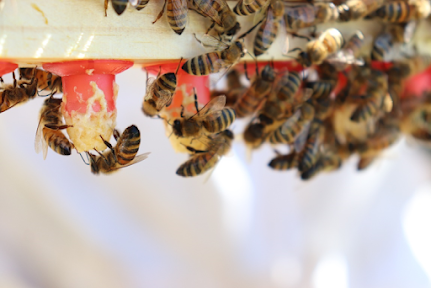It is that time of year! The beekeeping season is buzzing along, and the Atlantic Tech Transfer Team for Apiculture has been seizing every moment! For our field work, we are largely focused on three projects which span across the Maritime provinces. Read on for a glimpse into our major projects this summer and how they are progressing.
ATTTA Summer Update
Optimizing Wild Blueberry Pollination
This year, 2022, marks the final year of ATTTA’s five-year
study regarding the optimization of wild blueberry pollination by honey bees.
This season, we have eight research plots in wild blueberry fields in Nova
Scotia, New Brunswick, and Prince Edward Island. We first visited these fields
in May and early June, when honey bee hives were placed for pollination. At
this time, we assessed the hives for strength and assessed the percent bloom on
the fields. After the hives had been removed and pollinated flowers were
beginning to develop into berries, we returned to the fields to assess what
percent of flowers were successfully pollinated and appeared as unripe, green
fruit set. Now, we are in the midst of returning to each field a final time to
assess the percentage of ripe berries that are developed and ready for harvest!
We also assess these berries in the lab for weight and seed count.
The aim of the research is to evaluate the
effect of moving hives during pollination on blueberry fruit set and determining
the optimal timing of placing honey bee for wild blueberry pollination.
Efficacy of Apivar® and Api Life Var®
against Varroa destructor in eastern Canada
This summer, we are travelling through the
Maritimes, collecting honey bee samples, in order to test the efficacy of
Apivar® and Api Life Var® on Varroa mites. Starting at the end of July, we
visited nine apiaries to collect samples of honey bees and their associated
varroa mites for miticide testing. We brought the samples to our lab, treated
the bees, and assessed the varroa populations effected by the treatments. This
week, we began our second round of assessments, in which we return to the same
apiaries for another collection of bees and mites to sample for treatment.
The aim of this project is to assess the efficacy of Apivar® (amitraz) against Varroa destructor in honey bee colonies in NB, NS, and PE; determine the efficacy of Api Life Var® against Varroa destructor in honey bee colonies in NB, NS, and PE.
Overwintering Queen Bank Trial
As a second year of pilot work, our overwintering queen bank trial has
received additional funding and supported from Nova Scotia Beekeepers
Association. We are working towards overwintering two hives with multiple queens
banked within. In preparation for this, we completed two rounds of queen
rearing at the end of June and early July. We are also growing strong colonies
to eventually transform into our queen banks in the fall. In the spring, we
will see how many queens survived the winter in the banks and measure the viability
of those overwintered queens.
The aim of this project is to determine the
feasibility of mass queen overwintering outdoors in the Maritime region by evaluating
the success of two different queen bank configurations.
Throughout the fall and winter, we will be
able to assess the data that we collect in our summer field work. We look
forward to sharing our findings at various honey bee and wild blueberry
association meetings as well as here in our blog.
Connecting with ATTTA Specialists


